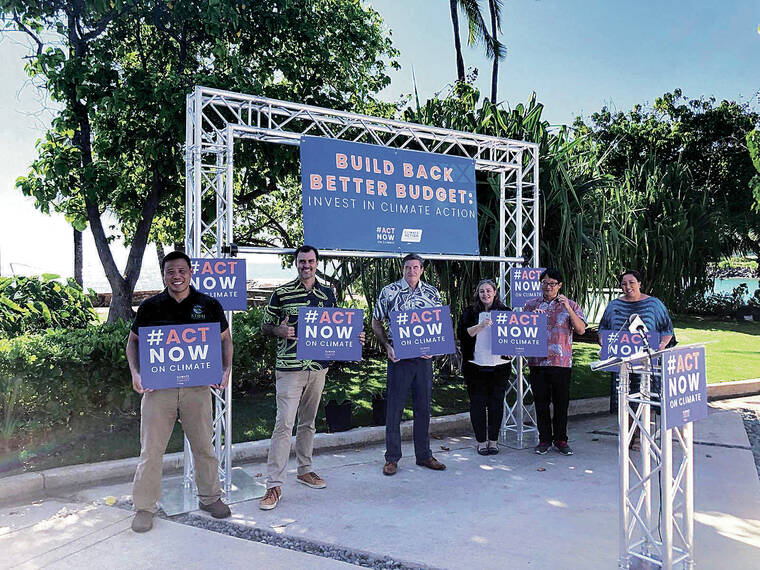Standing as a united front, various government and business leaders in Hawaii on Wednesday called on Congress to pass the Build Back Better Act, saying it was crucial for the state in the face of the climate change crisis.
State Rep. Nicole Lowen (D, Holualoa-Kailua-Kona) stood with Honolulu City Council Chairman Tommy Waters and others calling on the U.S. House of Representatives to take action this week.
During a press conference at Kupu Hawaii’s Harry and Jeanette Weinberg Ho‘okupu Center at Kewalo Basin Park, they also urged Congressman Ed Case “to follow through on his commitment” to vote for the act.
“Hawaii cannot afford any further delays,” said Lowen. “This is a once-in-a-lifetime opportunity to confront the climate crisis, create good-paying clean energy and conservation jobs and to address environmental injustices. Action is overdue and our leaders in Washington have a responsibility to come together and pass the Build Back Better Act.”
The act includes a package with at least $500 billion to tackle climate change.
It would set the United States on a path to a 50% to 52% reduction in carbon pollution by 2030, which is what scientists say is necessary to prevent the worst impacts of climate change, the group said.
It would make solar rooftop systems and electric vehicles more affordable for families in Hawaii, said Josh Stanbro, policy fellow with Elemental Excelerator, and create good-paying green jobs.
Before the COVID-19 pandemic, the group said, clean energy jobs were growing faster than the economy as a whole — and that as of this year, 12,550 Hawaii residents are employed in the clean energy sector.
“The Build Back Better bill is our last, best hope to keep Hawaii safe and livable in the face of the climate crisis,” he said. “Every day, every week, every month that goes by without Build Back Better being passed means the clock is ticking down on our island future.”
Waters said the act was not just a “nice-to-have” but a “need-to-have” legislation, and that climate change is an issue that keeps him up at night, along with affordable housing and the cost of living.
From 2010 to 2020, Hawaii experienced 145 extreme weather events that cost billions in damages, the group said. Hawaii faces numerous impacts from climate change, including floods, sea level rise and coral bleaching.
Wayne Tanaka, director of Sierra Club of Hawaii, said the act represents hope.
“This gives us a fighting chance to finally draw a line against climate change,” he said. “It gives us a 10-year plan to make the investments, to create the jobs, to cut our carbon footprint in half and build an economy that carries us through this climate crisis.”
Tanaka said Case had finally voiced his support for the bill and that he hoped the congressman would keep his word and vote for it.
The Sierra Club of Hawaii emailed its members, saying it was “make or break time” for the Build Back Better Act. Also, that both the bipartisan infrastructure bill, which President Joe Biden signed on Monday, and the act are necessary to meet the goal of cutting climate pollution in half by 2030.
The group also urged its members to contact Case, urging him “to keep his word and support the act.”
Case has been the target of local progressive groups, which in September teamed up in an effort to push the congressman — who they said was critical of the measures — to support the Build Back Better Act Opens in a new tab with a sign-waving event in Manoa and media campaign.
“The proposed Build Back Better Act, now at almost $2.2 trillion, is one of the most consequential votes I will ever take,” said Case in a statement Wednesday in response to the press conference. “I appreciate the thousands of communications I’ve received from throughout Hawaii both pro and con and everywhere in between. I support much of the proposal, including in particular its initiatives to meet the crisis of climate change.
“My focus has been not only to fully understand a complicated and often- changing 2,100 page bill, but to assure that it will actually deliver for those most in need and will be a responsible and sustainable investment of our nation’s financial resources,” he added. “I expect to have all the information I need for such a critical vote within the next few days.”

